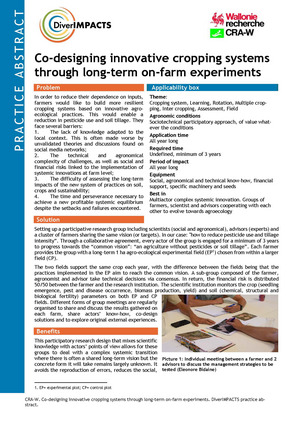Co-designing innovative cropping systems through long-term on-farm experiments
Authors: Daniel Jamar, William Gyselynck, Louise Legein
Problem: In order to reduce their dependence on inputs, farmers would like to build more resilient cropping systems based on innovative agro-ecological practices. This would enable a reduction in pesticide use and soil tillage. They face several barriers:
- The lack of knowledge adapted to the local context. This is often made worse by unvalidated theories and discussions found on social media networks;
- The technical and agronomical complexity of challenges, as well as social and financial risks linked to the implementation of systemic innovations at farm level;
- The difficulty of assessing the long-term impacts of the new system of practices on soil, crops and sustainability;
- The time and perseverance necessary to achieve a new profitable systemic equilibrium despite the setbacks and failures encountered.
Solution: Setting up a participative research group including scientists (social and agronomical), advisors (experts) and a cluster of farmers sharing the same vision (or targets). In our case: "how to reduce pesticide use and tillage intensity”. Through a collaborative agreement, every actor of the group is engaged for a minimum of 3 years to progress towards the “common vision”: “an agriculture without pesticides or soil tillage”. Each farmer provides the group with a long-term 1 ha agro-ecological experimental field (EP) chosen from within a larger field (CP).
The two fields support the same crop each year, with the difference between the fields being that the practices implemented in the EP aim to reach the common vision. A sub-group composed of the farmer, agronomist and advisor take technical decisions via consensus. In return, the financial risk is distributed 50/50 between the farmer and the research institution. The scientific institution monitors the crop (seedling emergence, pest and disease occurrence, biomass production, yield) and soil (chemical, structural and biological fertility) parameters on both EP and CP fields. Different forms of group meetings are regularly organised to share and discuss the results gathered on each farm, share actors’ know-how, co-design solutions and to explore original external experiences.
zenodo.org: Co-designing innovative cropping systems through long-term on-farm experiments

 tap and then scroll down to the Add to Home Screen command.
tap and then scroll down to the Add to Home Screen command.